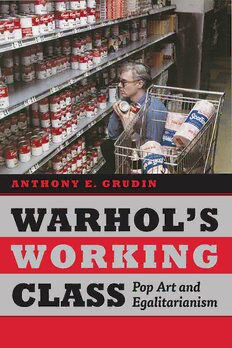Table Of ContentWarhol’s Working Class
W A R H O L ’ S W O R K I N G
C L A S S
Pop Art and Egalitarianism
Anthony E. Grudin
THE UNIVERSITY OF CHICAGO PRESS
Chicago and London
W A R H O L ’ S W O R K I N G
C L A S S
Pop Art and Egalitarianism
Anthony E. Grudin
THE UNIVERSITY OF CHICAGO PRESS
Chicago and London
The University of Chicago Press, Chicago 60637
The University of Chicago Press, Ltd., London
© 2017 by The University of Chicago
All rights reserved. No part of this book may be used or reproduced in any
manner whatsoever without written permission, except in the case of brief
quotations in critical articles and reviews. For more information, contact
the University of Chicago Press, 1427 E. 60th St., Chicago, IL 60637.
Published 2017
Printed in the United States of America
26 25 24 23 22 21 20 19 18 17 1 2 3 4 5
ISBN- 13: 978- 0- 226- 34777- 6 (cloth)
ISBN- 13: 978- 0- 226- 34780- 6 (e- book)
DOI: 10.7208/chicago/9780226347806.001.0001
Library of Congress CataLoging-in-PubLiCation Data
Names: Grudin, Anthony E., author.
Title: Warhol's working class : pop art and egalitarianism / Anthony E. Grudin.
Description: Chicago ; London : The University of Chicago Press, 2017. | Includes bibli-
ographical references and index.
Identifiers: LCCN 2017015347 | ISBN 9780226347776 (cloth : alk. paper) | ISBN
9780226347806 (e-book)
Subjects: LCSH: Warhol, Andy, 1928–1987. | Pop art—United States. | Art and society.
Classification: LCC N6537.W28 G78 2017 | DDC 700.92—dc23
LC record available at https://lccn.loc.gov/2017015347
This paper meets the requirements of ANSI/NISO Z39.48- 1992 (Permanence of Paper).
CONTENTS
Acknowledgments vii
Introduction: Warhol and Class 1
1 Varieties of Pop 17
2 Warhol’s Participatory Culture 40
3 Warhol’s Brand Images 75
4 Warhol, Modernism, Egalitarianism 110
Conclusion: Warhol’s Neoliberalism 146
Notes 159
Index 195
ACKNOWLEDGMENTS
T his book’s second chapter grew out of material
published in “‘Except Like a Tracing’: Defectiveness, Accuracy, and
Class in Early Warhol,” October, no. 140 (Spring 2012), and “Myth and Class
in Warhol’s Early Newsprint Paintings,” in Warhol: Headlines, ed. Molly Don-
ovan (Washington, DC: National Gallery of Art, 2011). Portions of Chapter
3 appeared in “‘A Sign of Good Taste’: Andy Warhol and the Rise of Brand
Image Advertising,” Oxford Art Journal 33, no. 2 (June 2010). Comments from
audiences at Middlebury College, Colgate University, Whitman College, the
Florida Institute of Technology, Tufts University, the ASAP conferences of
2011 and 2015, and the College Art Association conferences of 2011 and 2012
helped me to sort out the book’s claims.
This book benefited immensely from time I spent working at the Univer-
sity of California, Berkeley and California College of the Arts. I am grateful
to Elise Archias, Binta Ayofemi, John Beebe, Sylvan Brackett, Molly Brunson,
Anthony Cascardi, Kevin Chua, Neil Cox, Zach Davis, Kate Fowle, Darcy Grigsby,
Emily Gumper, Jason Hanasik, Al and Maria Huezo, Matt Hunter, Jessen Kelly,
Jonathan King, Kim Kono, Charlie Koven, Namiko Kunimoto, Leigh Marko-
poulos, Tara McDowell, Jeremy Melius, Doris and Charles Muscatine, Julian
Myers- Szupinska, Mike Shin, Aimee Sisco, Andrew Stewart, Sam Teplitzky,
Jess Theroux, Michael Thompson, Jenny Wapner, Alice Waters, Tim Webster,
Sarah Weiner, Robert Wetle, Johanna Wright, Justin Underhill, Greg Youmans,
Josephine Zarkovich, and Sebastian Zeidler for setting such fine examples of
engagement and conviviality.
Friends, colleagues, and collaborators during my time in Vermont have
contributed to this book at every stage. I particularly want to thank Mildred
Beltre, Jessica and Josh Bongard, Lynne Bond, Silas Branson, Thomas Bren-
nan, Jake Brochhagen, Tam Bryfogle, Steve Budington, Janie Cohen, Bradford
Collins, Penny Cray, Wright Cronin, Cami Davis, Sona Desai, Paul Deslandes,
Kelley Di Dio, Maggie Donin, Molly Donovan, Nancy Dwyer, Bill Falls, Kat Ford,
Pamela Fraser, Chelsea Frisbee, Andy Frost, Larissa Harris, Michael Hermann,
Susie and Dave Hurley, Adrian Ivakhiv, Jane Kent, Andy Kolovos, Felicia Korn-
bluh, Ellen Kraft, Louise Lawler, Eric Lindstrom, Jess and Will Louisos, Ted
Lyman, Hilary Martin, Hilary Maslow, Jason McCune, Bill McDowell, Abby
McGowan, William Mierse, Thomas Morgan- Evans, Ilyse Morgenstein Fuerst,
Frank Owen, Peter Parshall, Breanna Pendleton, John Penoyar, Abby Portman,
Neil Printz, Bill Racolin, Jordan Rose, Julie Rubaud, Kristina Samulewski, Uli
Schygulla, John Seyller, John Smith, Michael Sundue, Randall Szott, Britta and
Jeff Tonn, Mark Usher, Sally Wales, Kelley Walsh, Laurel and Morgan Waters,
Rebecca Weisman, Erika White, Alison Williams, Gilda Williams, Tom Wil-
liams, Matt Wrbican, and Frank Zelko.
viii Whitney Davis, Jonathan Flatley, Hal Foster, Kaja Silverman, and Anne
Wagner deserve special thanks for having been particularly generous in their
attention to this project. I will forever be grateful to Tim Clark for his guidance
as the book developed. Support from the Warhol Foundation, the Lichten-
stein Foundation, the Oldenburg van Bruggen Studio, and the University of
Vermont’s Humanities Center and Lattie F. Coor Endowment was crucial to
its completion.
Finally, I am tremendously grateful to my family— Bethanne, Jeff, Joyce, and
Jasmine Cellars, Amelia and Scott Siegel, and Cristina, Michaela, Max, Mateo,
Nick, Ted, Micha, and Robert Grudin— for their love and support, and to Susan
Bielstein, Joel Score, James Whitman Toftness, and the anonymous readers
at the University of Chicago Press for all the care they devoted to this process.
This book is dedicated to Joyce and Jasmine Cellars.
aCknowLeDgments
As an American, Warhol dealt particularly with the
“hidden injuries of class,” and for that he is still hated.
sCott burton, “anDy warhoL: 1928– 1987,” Art in AmericA
But I shouldn’t say class, because we
don’t live in a nation of classes.
heLen Peters, in stuDs terkeL, Division street: AmericA

